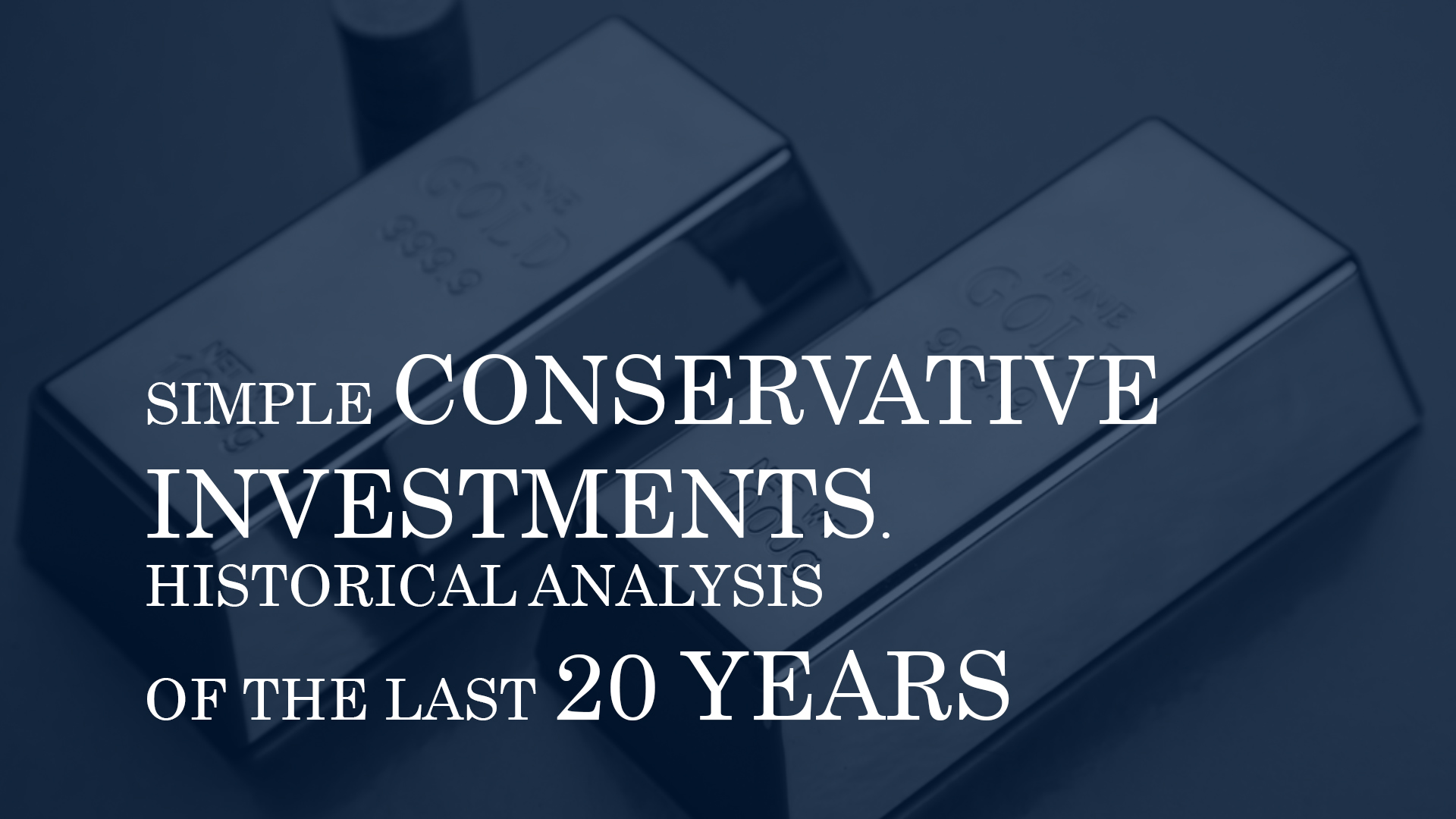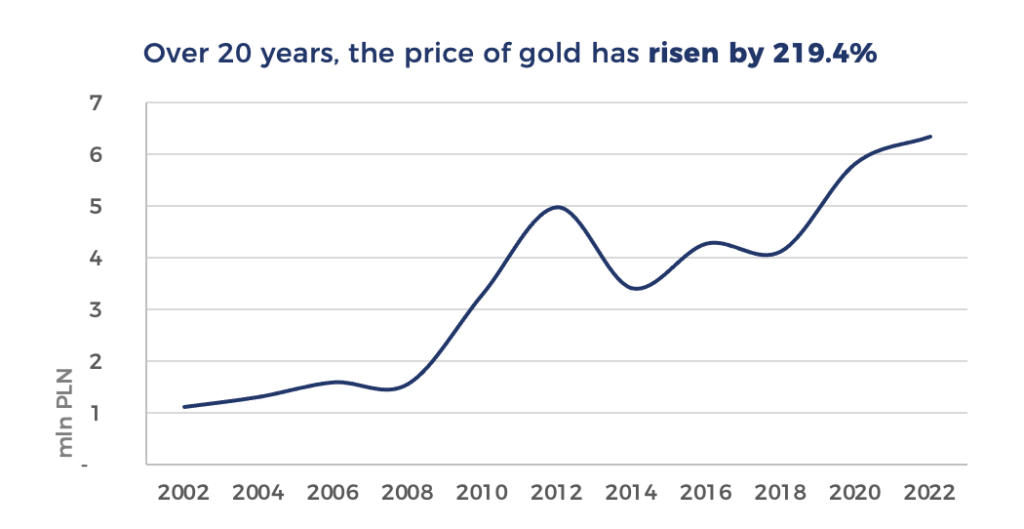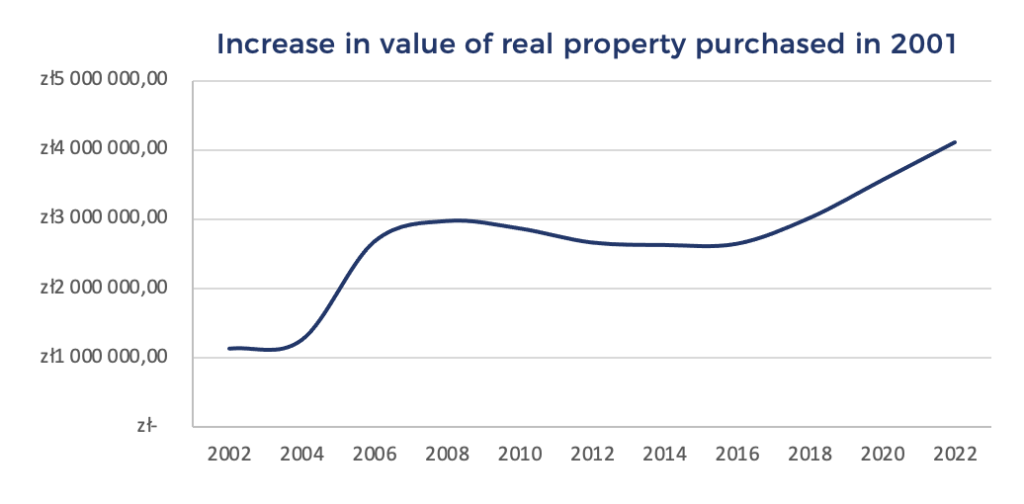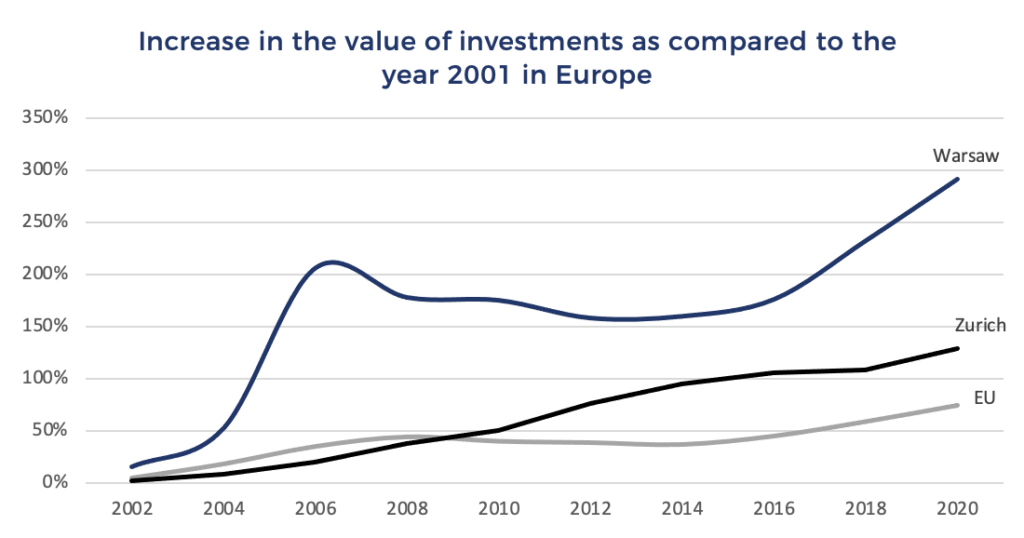SIMPLE CONSERVATIVE INVESTMENTS. HISTORICAL ANALYSIS OF THE LAST 20 YEARS

Customers keep asking me what to do as far as unrest on the eastern border is concerned.
Due to the war threat in Ukraine the emotions are at their peak, and the questions are surprising. While some customers ask whether to buy gold, others wonder if they should sell precious metals and place the funds in Switzerland (and then move there). As for the issue of moving to another country, for example to Spain or another place in Europe, I recommend that you read our text about changing the tax residence. To the hot-headed ones thinking about buying dollars, for example, I suggest to cool down, open a bottle of wine and take a look at how the situation on the investment markets has been developing over the last 20 years.
Obviously, I am referring to the investments that are perceived as conservative, i.e. providing reasonably steady growth and protecting capital, and the questions are being raised more and more often when we face the fear of an armed conflict. Investments in gold and real property are considered as cheap and rather well-known to everyone, as well as investments in the US dollar, which are still very much popular with a part of our society.
What does the analysis show?
The following analysis shows the changes to the portfolio if we purchased particular assets 20 years ago. That is, when we invested PLN 1,000.000 in each of these assets, the analysis indicates how the value of the portfolio has increased over 20 years and its value today.
How the gold market has been developing?
When we ask a theorist about an investment in gold, we will probably hear that it is a safe asset that provides protection mainly against inflation. If we look at the history of the last 20 years, it works extremely well – so well that it is hard to say about the conservative nature of the investment in gold.

It is worth paying attention to the changes of gold prices in the periods of crisis, i.e. the years 2008, 2012 and 2021. In the period between the years 2008 and 2012, the price of gold increased to 219.4%, which gives an average increase of 54.75% per year. An important factor that influenced such an increase was the crisis in the year 2008. After a temporary decrease in price since the beginning of the pandemic in 2019, gold price increased again by 31.5%. It is assumed that this metal provides a great protection of capital against inflation or helps to store cash during periods of economic uncertainty, and there are very good reasons for this. We should be talking about unrest today. Gold is a desirable metal and its supply has been at a very low, constant level for many years and it cannot be printed as fiat money. The historical analysis only confirms that gold is doing well during the period of economic slowdown and crisis. However, if we go back to the issue of protection of capital against inflation and return on investment in gold, it turns out that the buying power of PLN 1 million in the year 2000 – today equals 1.78 million[1].
In other words, in order to have the equivalent of PLN 1 million from the year 2001, in the year 2022 we need about PLN 1.8 million, which results from cumulative inflation for this period, it reached 79%! If at the same time PLN 1 million was invested in gold, such an investment turned out to be “a little more” profitable, generating PLN 6 million profit. Now the question is what was the actual inflation during the examined period of 20 years.
Gold today
It must of course be taken into account that currently, i.e. at the beginning of the year 2022, the fluctuations in the price of gold are huge. However, this does not change the fact that gold is a hedge against inflation in the long term, and before the potential armed conflict, it is gold that ensures safety. It is true that now, in the post-covid era, the economy is heated up, and all governments led by the US are pumping huge amounts of money into it. Companies are experiencing unprecedented growth, it is hardly surprising that the market may to some extent underestimate the fact of any crisis. We should also not underestimate the outflow of money in cryptocurrencies, which obviously provide better liquidity, not to mention the problem of storage, as compared to traditional gold.
The increase in the value of dollar (8% in 2021) and, finally, the current increase in interest rates do not influence the price of gold. However, if we follow history, political climate and the accompanying inflation constitute historically sufficient reasons for a positive attitude towards gold. You can read more in the text “Investor during the pandemic“.
What does the real property market look like?
When observing the behaviour of Poles, one can get the impression that they love real property, especially their own – unlike inhabitants of many Western countries, where a large percentage of residents always prefer rental, regardless of the amount of their earnings. In Poland, however, the trend seems to be the opposite. Obviously, this is only one of the factors influencing real property prices in large cities, especially in Warsaw. Our presence in the European Union is also important as well as the openness of institutional investors (funds) to investments in Warsaw. All of this, combined with low (recently) interest rates and relatively high inflation, means that one of the simpler investments, where we can still engage more capital, is buying an apartment (or plot of land). It is believed that real property does not lose its value, and its prices will only increase. However, as the subprime crisis has shown us, it does not seem to be entirely the case, as presented in the chart below.

As shown in the chart, between the years 2007 and 2013, the trend was downward – a slight decrease, but still. In the long run, of course, investment in real property has yielded high returns. The trend is unlikely to change in the foreseeable future, given the significant increases in the price of raw materials such as steel or concrete and the significant demand for apartments driven by fear of inflation. Moreover, we still believe that real property prices in Warsaw have their potential as compared to the prices of real property in other EU capitals today. It is presented in the chart below. Note! The chart does not show the prices of apartments (because the prices of apartments in Warsaw are on average 46.18% lower than the prices of apartments in the EU). The chart below shows how much our portfolio has increased if we invested it in real property on the Vistula River, versus real property in the EU or in Switzerland.

The analysis also indicates that an investment in real property in Poland would generate significant benefit, but not as spectacular as in gold. It is also difficult to assess what influenced such a significant fluctuation between the years 2005 and 2007. It might have been a market correction, where prices of apartments were slightly overheated in the initial period (2005).
Is it worth investing in dollars?
Finally, as a curiosity, we present an unfortunate investment in the US dollar. According to the analysis, in the perspective of 20 years, it would be considered as a failed investment. However, in the analysed period, there were also years in which the return on purchasing the dollar would be extremely high. A good example may be the year 2009 when the increase, as compared to the previous year, reached 43.1%. However, this result was probably caused by a strong depreciation of the Polish zloty in the following year, i.e. 2009 (the situation was similar in the case of other currencies such as the euro or the franc). One of the reasons for such a situation was the rapid outflow of funds from the Polish market due to the crisis of Western Europe, in Poland there was a decrease in foreign investments after the crisis in 2008.

As we can see, a significant increase could have been achieved by investing during the crisis in 2008, but the dollar as a long-term investment seems to be a bad idea. When buying dollars for PLN 1 M in 2001, we would make a loss not only due to inflation but due to the mere decrease in the value of dollar (or strengthening of the Polish zloty), which results in the fact that the potential portfolio in this currency today is being less profitable than 20 years ago. Such an investment would make sense facing a significant decrease in the value of the Polish zloty, and as history shows, for the last 20 years Poland has been dynamically developing and the country has been strengthening its economic position. Let us summarise here how the investments discussed are illustrated in the comparative chart. The comment seems obvious.

Despite the escalation of the threat, Ukraine seems to be the least concerned about the situation that is happening right next door. On the other hand, the involvement in publicizing the topic by the Western media, in particular the American, is important. You can see the reactions in the stock markets. It resembles a bit the reaction of the markets to information about Coronavirus. But now there are slightly different conditions, because apart from Putin we have a bit inflated economy, rising inflation, so any possible decreases may have long-lasting effects. Certainly, they cannot be excluded completely. Perhaps investing in conservative instruments is the right thing to do now?
[1] https://www.podatki.gov.pl/kalkulatory-podatkowe/kalkulator-inflacji/

Blog edited by dr Anna Maria Panasiuk

Founder and Managing Partner of Panasiuk & Partners, with many years of expertise in wealth management.
Authors
dr Maja Czarzasty- Hercberg
OF COUNSEL/ATTORNEY-AT-LAW
Dorota Sajewicz
investment partner
dr Adam Barcikowski
Head of Tax | Certified Tax Advisor
Marta Kwiatkowska - Abramowska
legal assistent
Sylwia Rozwandowicz
ADVOCATE
Sylwia Rybicka
dyrektor ds. rozwoju
Michał Nowacki
radca prawny
Paweł Turek
doradca podatkowy
Katarzyna Zając
aplikant radcowski
Yours Panasiuk
Antoni Goraj
radca prawny
Edyta Winnicka
prawnik
Paweł Szumowski
aplikant radcowski
Yours Panasiuk
Katarzyna Bieńkowska
radca prawny,
doradca podatkowy YOURS Panasiuk
Kamil Kowalik
doradca podatkowy
Monika Baran
radca prawny
Adam Apel
doradca podatkowy
Piotr Świąć
adwokat
Sabina Tyszko
tax consultant
Szczepan Adamski
OF COUNSEL | LAWYER | PRESIDENT OF THE MANAGEMENT BOARD OF YOURS SP. Z O.O.
Magda Kwiatkowska
radca prawny
Andrzej Sałamacha
PARTNER | ATTORNEY-AT-LAW | CERTIFIED INSOLVENCY AND RESTRUCTURING ADVISOR
dr Anna Maria Panasiuk
managing partner | advocate | wealth advisor
Maciej Małachowski
TRAINEE ATTORNEY-AT-LAW
Klaudia Borkowska
Advocate trainee
Archives
-
2024

-
2023

-
2022

-
December

- POLISH FAMILY FOUNDATION – A new solution for entrepreneurs
- POLSKA FUNDACJA RODZINNA – nowe rozwiązanie dla przedsiębiorców
- INVESTMENT FUNDS IN THE NETHERLANDS – ABC OF SETTING UP OF AIF
- FUNDUSZE INWESTYCYJNE W HOLANDII – ABC ZAŁOŻENIA AFI
- TAX INCENTIVES TO INVEST IN AN ALTERNATIVE INVESTMENT FUND (AIF)
- ZACHĘTY PODATKOWE DO INWESTYCJI W ALTERNATYWNĄ SPÓŁKĘ INWESTYCJNĄ (ASI)
-
November

-
October

- CAN AN ALTERNATIVE INVESTMENT FUND SERVE THE PURPOSES OF PRIVATE INVESTMENTS?
- CZY ALTERNATYWNA SPÓŁKA INWESTYCYJNA MOŻE SŁUŻYĆ PRYWATNYM INWESTYCJOM?
- M&A – TRANSACTION TRIVIA IN MERGERS & ACQUISITIONS
- M&A – CIEKAWOSTKI TRANSAKCJI MERGERS & ACQUISITION
- HISZPAŃSKA REZYDENCJA PODATKOWA – PUZZLE DLA WTAJEMNICZONYCH!
- Spanish tax residence – jigsaw puzzles for the initiated!
-
September

-
August

-
July

-
May

- PODWÓJNA REZYDENCJA PODATKOWA – 4 PRZYKŁADY POWSTANIA [CZĘŚĆ II OSOBY PRYWATNE]
- DUAL TAX RESIDENCE – 4 EXAMPLES OF ITS EMERGENCE [PART II NATURAL PERSONS]
- INVESTORS’ Q&A ABOUT THE ALTERNATIVE INVESTMENT FUNDS
- O CO NAJCZĘŚCIEJ PYTAJĄ INWESTORZY W KONTEKŚCIE ASI (ALTERNATYWNYCH SPÓŁEK INWESTYCYJNYCH)?
- REVOLUTION ON THE MERGERS & ACQUISITIONS MARKET – RECORD-BREAKING M&A TRANSACTIONS IN POLAND
- REWOLUCJA NA RYNKU FUZJI I PRZEJĘĆ – REKORDOWE TRANSAKCJE M&A W POLSCE
- 7 SINS COMMITTED WHILE RUNNING A BUSINESS AND MAKING INVESTMENTS
- 7 GRZECHÓW PRZY PROWADZENIU BIZNESU I INWESTYCJACH
-
April

-
March

-
February

- SIMPLE CONSERVATIVE INVESTMENTS. HISTORICAL ANALYSIS OF THE LAST 20 YEARS
- PROSTE INWESTYCJE KONSERWATYWNE. ANALIZA HISTORYCZNA OSTATNICH 20 LAT
- CZY WARTO ZAMIESZKAĆ W HISZPANII? PRAWO BECKHAMA, CZYLI JAK NIE PŁACIĆ PODATKÓW W HISZPANII
- IS IT WORTH LIVING IN SPAIN? BECKHAM ‘S LAW, HOW TO AVOID PAYING TAXES IN SPAIN
- ESTONIAN CIT 2022 AS A REMEDY FOR THE POLISH DEAL
- ESTOŃSKI CIT 2022 JAKO REMEDIUM NA POLSKI ŁAD
-
January

- HOW CAN YOU SET UP AN ALTERNATIVE INVESTMENT FUND IN A FEW WEEKS?
- JAK MOŻNA ZAŁOŻYĆ ALTERNATYWNĄ SPÓŁKĘ INWESTYCYJNĄ W KILKA TYGODNI?
- DO CLOSED-END INVESTMENT FUNDS STILL PAY OFF?
- CZY FUNDUSZE INWESTYCYJNE ZAMKNIĘTE JESZCZE SIĘ OPŁACAJĄ?
- 6 REASONS WHY IT IS WORTH DEVELOPING A BUSINESS OUTSIDE POLISH BORDERS
- 6 POWODÓW, DLA KTÓRYCH WARTO ROZWIJAĆ BIZNES POZA POLSKĄ
-
December
-
2021

-
December

-
November

-
October

- LIFE IN TENERIFE – TAXES AND REAL ESTATE IN THE CANARY ISLANDS
- TENERYFA NA ŻYCIE – PODATKI I NIERUCHOMOŚCI NA WYSPACH KANARYJSKICH
- TURNKEY REORGANISATION – HOW TO PREPARE A BUSINESS FOR INTERNATIONAL EXPANSION
- REORGANIZACJA POD KLUCZ CZYLI JAK PRZYGOTOWAĆ BIZNES NA EKSPANSJĘ ZAGRANICZNĄ
- BUSINESS EXPANSION OUTSIDE THE EU – LET’S HAVE A LOOK AT OTHER CONTINENTS
- EKSPANSJA BIZNESU POZA UE – SPÓJRZMY NA INNE KONTYNENTY
-
September

-
August

- MAJĄTEK RODZINNY
- COMPANY RELOCATION WITHIN THE EU: PROCESS ANALYSIS AND CASE STUDY
- PRZENIESIENIE SPÓŁKI W OBRĘBIE UE: ANALIZA PROCESU I CASE STUDY
- SCALING UP BUSINESS. TAXES IN ESTONIA, ITALY, UNITED KINGDOM, MALTA AND CYPRUS – COMPARISON
- EKSPANSJA BIZNESU. PODATKI W EUROPIE.
- POLSKI ŁAD OCZAMI PRZEDSIĘBIORCY
-
July

- EXPANDING NEXT DOOR – THE CZECH REPUBLIC, SLOVAKIA, GERMANY, ROMANIA
- EKSPANSJA PO SĄSIEDZKU – CZECHY, SŁOWACJA, NIEMIECY, RUMUNIA
- CONVERTIBLE DEBT IN POLAND
- CONVERTIBLE DEBT PRZY INWESTYCJACH PRE-SEED
- AIFs (ALTERNATIVE INVESTMENT FUNDS) LEAD THE WAY ON THE POLISH CAPITAL MARKET
- ASI WIEDZIE PRYM NA POLSKIM RYNKU KAPITAŁOWYM
- FAMILY FOUNDATIONS IN POLAND. CONCEPT VERSUS ENTREPRENEURS’ EXPECTATIONS
- FUNDACJA RODZINNA W POLSCE. ISTOTA POMYSŁU A OCZEKIWANIA PRZEDSIĘBIORCÓW
-
June

- CORPORATE TAX RELIEF AND INCENTIVES FOR INVESTORS – NEW (BETTER?) SOLUTIONS
- ULGI PODATKOWE I ZACHĘTY DLA INWESTORÓW – IDZIE NOWE (LEPSZE?)
- 9% CIT ZAMIAST 19%, JAK PŁACIĆ NIŻSZY PODATEK
- CYPRUS VS. UNITED ARAB EMIRATES, WHERE TO MOVE? CHANGE OF TAX RESIDENCE
- CYPR VS. ZJEDNOCZONE EMIRATY ARABSKIE, GDZIE SIĘ WYPROWADZIĆ? ZMIANA REZYDENCJI PODATKOWEJ
-
May

-
April

-
March

-
February

-
January

- 6 MAJOR CHANGES IN THE BEHAVIOUR OF PRIVATE INVESTORS AND THEIR PORTFOLIOS IN 2020
- 6 GŁÓWNYCH ZMIAN W ZACHOWANIACH I PORTFELACH INWESTORÓW PRYWATNYCH W ROKU 2020
- TAX SIMPLIFICATION 2021 IN POLAND – A MAGNET FOR FOREIGN INVESTORS
- UPROSZCZENIA PODATKOWE 2021 W POLSCE – MAGNESEM DLA INWESTORÓW ZAGRANICZNYCH
- ALTERNATIVE INVESTMENT FUND (AIF) – A FIRST-CLASS INVESTMENT VEHICLE AT YOUR FINGERTIPS
- ALTERNATYWNA SPÓŁKA INWESTYCYJNA (ASI). PIERWSZORZĘDNY WEHIKUŁ INWESTYCYJNY NA WYCIĄGNIĘCIE RĘKI
- ESTONIAN CIT – EFFECTIVE REDUCTION IN CORPORATE TAX IN POLAND
- CIT ESTOŃSKI – EFEKTYWNE OBNIŻENIE OPODATKOWANIA SPÓŁEK W POLSCE
-
December
-
2020

-
December

-
November

- WE BREAK STEREOTYPES! PRECONCEPTIONS ABOUT LAWYERS AND THE REALITY OF BUSINESS
- AM I REALLY SAVING MYSELF MONEY? TODAY I WILL SAVE 100 PLN TO LOSE 1000 PLN TOMORROW
- ŁAMIEMY STEREOTYPY! CZYLI PRZEKONANIA O PRAWNIKACH, A REALIA BIZNESU
- CZY TO NAPRAWDĘ OSZCZĘDNOŚĆ? DZIŚ „ZAOSZCZĘDZĘ” 100 ZŁ ŻEBY JUTRO STRACIĆ 1000 ZŁ
- ZAPRASZAMY do MONAKO
- WHY IS IT WORTH BECOMING A TAX RESIDENT OF MONACO?
- DLACZEGO WARTO ZOSTAĆ REZYDENTEM MONAKO? PODATKI W MONAKO
-
October

-
September

-
August

-
June

- THE WORLD IS CHANGING, AND YOU ARE STILL LOOKING FOR A UNICORN? In this article, we tell you everything you need to know to find one
- ŚWIAT SIĘ ZMIENIA, A TY WCIĄŻ SZUKASZ JEDNOROŻCA. Wszystko co musisz wiedzieć aby go znaleźć napisaliśmy tutaj
- KRYZYSOWE INWESTYCJE, CZYLI: ODWAŻNA INWESTYCJA WYMAGA OSTROŻNEGO PLANOWANIA
- JAK TRWOGA TO DO PRAWNIKA – NIEPOKOJĄCE TENDENCJE WŚRÓD STARTUPÓW
-
May

-
April

- AMERICAN TAX COMPETITION. HELPFUL OR “HARMFUL”
- KONKURENCJA PODATKOWA PO AMERYKAŃSKU. POŻĄDANA, CZY „SZKODLIWA”
- PIENIĄDZE TO NIE WSZYSTKO. Czyli jak inwestować, żeby nie stracić
- INVESTING IN HARD TIMES: HOW TO SET UP YOUR BUSINESS IN NEW YORK
- APETYT NA INWESTYCJE W TRUDNYCH CZASACH. SPÓŁKA W NOWYM YORKU
- WPŁYW PANDEMII NA TRANSAKCJE FUZJI I PRZEJĘĆ
- IMPACT OF A PANDEMIC ON MERGERS AND ACQUISITIONS
- PODATKI NA TRUDNE CZASY
-
March

-
February

-
December
-
2019

-
2018

-
2017

-
2016

-
2015

-
December

-
November

- Zwrot PCC od czynności restrukturyzacyjnych z udziałem spółek komandytowo-akcyjnych
- Zmiany podatkowe na Cyprze zachętą dla potencjalnych inwestorów
- Cypryjskie fundusze inwestycyjne mogą korzystać ze zwolnienia podatkowego w Polsce
- Nowe sankcje za niezłożenie sprawozdania finansowego
- Europejskie poświadczenie dziedziczenia
-
October

-
July

-
December
Categories
- Alternative Investment Fund (15)
- Expansion (12)
- Investments (34)
- Jurisdictions (11)
- Law (13)
- M&A (11)
- POLISH FAMILY FOUNDATION (2)
- Polish Holding Company (2)
- Relocation (9)
- Reorganisation (6)
- Succession (9)
- Tax (28)
- Tax accounting (2)
- Tax Preferences (2)
- Tax Residence (10)
- Wealth Advisory (9)
New publications
You want to be up to date, enter your e-mail address and you will receive new publications straight to your inbox:

